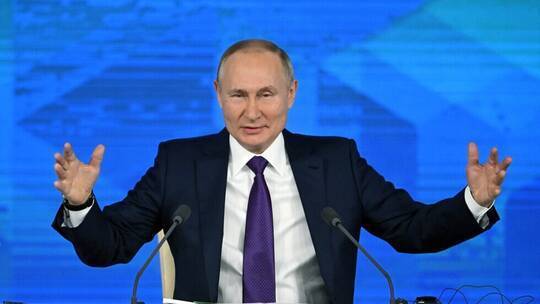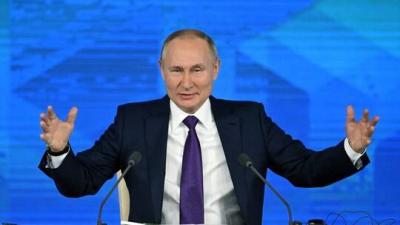The rhetoric from Western countries regarding "unprecedented" sanctions against Russia if it invades Ukraine has intensified, targeting Russian President Vladimir Putin personally. A Russian diplomat revealed ongoing coordination between Moscow and Beijing to counter these sanctions. While Washington and Berlin threaten a set of sanctions, and London has promised immediate measures, Moscow has been fortifying itself with various economic actions since 2014.
A war of words erupted on Tuesday between Britain and Russia concerning the potential invasion of Ukraine and the expected sanctions, alongside Washington's attempts to drag Russia into a conflict. During British Prime Minister Boris Johnson's visit to Kyiv, where he met with Ukrainian President Volodymyr Zelensky, he spoke of a sanctions package. In response, Russian President Vladimir Putin commented from Moscow with Hungarian Prime Minister Viktor Orbán, claiming that the West aims to provoke Russia into a war to enforce sanctions against it.
Johnson stated that the UK would impose immediate sanctions the moment "the first Russian soldier's boot" touches Ukrainian soil. He accused Putin of "holding a gun to Ukraine's head," calling for the Kremlin to withdraw from what he termed a "military disaster." Putin countered, asserting that the West and Washington want to provoke Russia into war in order to impose sanctions, highlighting that "the United States ignored Russia’s security guarantee concerns." He added that "the West promised not to extend NATO a single inch eastward but deceived us and acted differently; Washington seeks to contain Russia and uses Ukraine as a tool for that, with missile launch platforms in Romania and Poland threatening Russia."
In addition to sanctions against Putin and his associates, the West may consider banning Russian banks from transactions in dollars and excluding Moscow from the global "SWIFT" financial system, along with obstructing the "Nord Stream 2" pipeline. However, Russia has survived waves of Western sanctions following the 2014 annexation of Crimea, which led to the depreciation of the ruble and a decline in foreign investment. To safeguard itself, Moscow has developed a plan called "Fortress Russia," measures designed to ensure the Russian economy and financial system do not collapse due to new sanctions, according to AFP.
The Russian sovereign wealth fund holds assets worth $182 billion, or about 12 percent of its GDP, according to the Russian Ministry of Finance. The country also has relatively low external debt compared to other global powers and a significant reserve of foreign currencies accumulated by the central bank, as reported by "Deutsche Welle." Moscow has pursued a "de-dollarization" policy for several years, urging its partners, such as China and India, to make payments in alternative currencies and has launched its own payment system "Mir," widely used in Russia and former Soviet countries.
Kristin Bershina, a senior researcher at the German Marshall Fund, observes that Russia has taken steps to create an economic buffer zone following the sanctions experienced throughout most of the past decade. She adds that "Russia possesses enormous currency reserves that enable it to meet its sovereign debts, though it may face some economic challenges." Meanwhile, Russian affairs analyst Ashraf Al-Sabbagh views calls for separating Russia from the SWIFT system as part of "impossible threats" or, diplomatically speaking, "unrealistic assumptions." He explained in statements to "Sky News Arabia": "Excluding Russia from this system would be like detonating a nuclear bomb for financial markets, commodities, services, and banking transactions, along with the global financial system, fundamentally disrupting international payment movements."
Analysts believe Russia has several tools for response, as Europe relies on Russian oil and gas, especially with the current high gas prices across the continent. Cutting Moscow off from international payment systems would complicate payment processes for Europe regarding its gas imports, more than a third of which come from Russia. There are also concerns that Russia may use its energy dominance as leverage and may halt supplies.
In retaliation to the 2014 sanctions, Moscow imposed a ban on imports of most food products from the West and implemented an "import substitution" strategy. This initiative encourages Russian companies to replace goods such as French and Italian cheese with local products, an action Putin described as an "opportunity" for his country. Regarding the possibility of Moscow leveraging gas supplies to pressure the West, Russian affairs expert Nabil Rashwan stated, "Russian gas has succeeded in dividing European positions towards Russia; for example, Hungary and Serbia signed an agreement with Russia at an enticing price compared to current market rates, and Germany insists on completing the (Nord Stream 2) despite opposition from America and Biden's eventual acceptance."
In a step toward allies in combating Western pressures, Russian Ambassador to China Andrei Denisov disclosed on Wednesday that Moscow and Beijing have been increasingly discussing the use of national currencies in their mutual financial transactions and coordinating efforts to counter sanctions. He added that "sanctions have negative impacts on some aspects of our relations," acknowledging that, in recent years, discussions have intensified with Beijing about broader use of national currencies in external trade operations. He continued, "Therefore, we will definitely implement all possible measures to counter the pressures of the imposed sanctions, and we are discussing this with our Chinese partners."
American aerospace giant Boeing heavily relies on titanium supplies from Russia, so U.S. sanctions on metal exports would severely damage the American company, according to Russian media reports. Experts note that the U.S. aircraft industry imports 60 percent of its titanium from Russia, procured from the Russian company "VSMPO-AVISMA". Boeing warned that tensions between Moscow and Washington over Ukraine threaten its supply chain, stating on Wednesday that the tensions create an "unfavorable climate" for its operations and jeopardize its supply chain. Western nations are deliberating potential sanctions against Russia in light of the Ukrainian crisis, which Moscow has repeatedly rejected.




